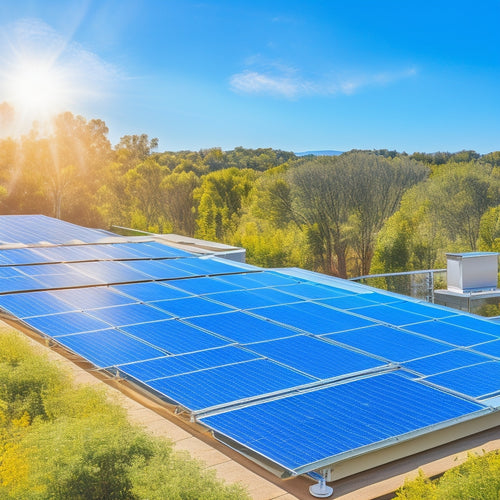
Why Choose Off-Grid Solar for Your Home
Share
By choosing off-grid solar for your home, you'll enjoy significant cost savings from utilizing free solar energy, reducing your reliance on the grid and stabilizing your energy expenses. You'll also minimize your environmental impact, contributing to energy independence and community resilience. As you investigate off-grid solar, you'll realize it's not just about installing panels - it's about understanding your energy needs, selecting the right equipment, and ensuring proper installation and maintenance. By taking the next step, you'll reveal the details that will help you make an informed decision about switching to a self-sustaining energy system.
Key Takeaways
- Off-grid solar provides significant cost savings by utilizing free solar energy and reducing reliance on the grid.
- It offers stable and predictable energy expenses, avoiding fluctuations and promoting energy independence.
- Off-grid solar has a minimal environmental impact, producing no emissions or pollution and contributing to community resilience.
- With off-grid solar, you can customize your system design to meet specific energy needs and land size requirements.
- Off-grid solar systems can be designed to ensure maximum energy production and longevity with proper installation and maintenance.
Off-Grid Solar Benefits Explained
Embracing off-grid solar power for your home can be a revolutionary shift, offering numerous benefits that can change your energy environment.
You'll experience significant cost savings by utilizing free energy from the sun, reducing your reliance on the grid and lowering your energy bills. Off-grid solar power also allows you to break free from the fluctuating costs of traditional energy sources, providing a stable and predictable energy expense.
Furthermore, off-grid solar power has a minimal environmental impact, producing no emissions or pollution. By achieving energy independence and community empowerment, you'll be contributing to a more sustainable future and strengthening community resilience.
Assessing Your Energy Needs
Take stock of your energy usage to determine how much power you need to generate from the sun. Start by tracking your energy consumption over a year to identify patterns and peak usage periods.
Consider the number of people living in your home, the types of appliances you use, and your lighting needs. You'll also want to assess your solar resources, including the amount of direct sunlight your location receives and any shading issues.
Calculate your total daily energy requirements in watt-hours (Wh) or ampere-hours (Ah) through an energy audit, listing all devices including lights, refrigerators, and computers with power consumption.
Choosing the Right Equipment
You've determined your energy needs, now it's time to select the right equipment for your off-grid solar system.
Solar panel types, such as monocrystalline, polycrystalline, or thin-film, vary in efficiency and cost. Consider factors like climate, roof size, and budget when choosing the best fit.
Ideal site selection is essential, considering shading and wind direction to maximize energy production. Larger land requirements enable customized designs based on specific energy needs.
Next, you'll need to select suitable battery options, like deep-cycle lead-acid, lithium-ion, or nickel-cadmium, based on your energy storage requirements.
Inverter selection is vital, as it converts DC power to AC for your home. Look for an inverter that matches your system's voltage and power output.
Installation and Maintenance Tips
When planning the installation of your off-grid solar system, a well-designed layout is essential to confirm maximum energy production and longevity.
You'll want to ascertain that your solar panels are installed at the ideal angle and direction to capture the most sunlight. During the installation process, make certain to secure your panels firmly to the roof or ground to withstand harsh weather conditions.
After installation, establish a regular maintenance schedule to inspect and clean your panels, check for loose connections, and monitor your system's performance. This will help you identify and address any issues promptly, assuring your off-grid solar system operates efficiently and effectively over its lifespan.
Overcoming Common Challenges
Off-grid solar systems can be susceptible to various challenges that may hinder their ideal performance, and being aware of these potential issues is crucial to overcoming them effectively.
You'll want to verify your system's battery storage is properly sized to handle periods of low sunlight or high energy demand. This will help maintain system resilience and prevent battery depletion.
Additionally, consider installing a backup generator or energy-efficient appliances to reduce your energy load.
Regularly inspect and maintain your system to identify potential issues before they become major problems.
Frequently Asked Questions
Can I Use Off-Grid Solar With My Existing Electrical System?
Can you really integrate off-grid solar with your existing electrical system? Yes, you can! You'll need to verify solar compatibility, but it's worth it for the energy independence - you'll be generating your own power, free from the grid's constraints.
Do I Need a Backup Generator for Cloudy Days?
You'll likely need a backup generator for prolonged cloud cover, as your off-grid solar system's energy storage may not cover extended periods of low sunlight, ensuring a reliable power supply during those times.
How Do I Ensure My System Meets Local Building Codes?
When you're in uncharted territory, it's crucial to steer through local regulations carefully. You'll need to research and comply with local building codes, ensuring your system meets standards through rigorous system inspections, avoiding costly reworks down the line.
Can I Add More Panels to My System in the Future?
You can easily add more panels to your system in the future if you plan for future expansion during the initial installation, ensuring panel compatibility and avoiding costly upgrades or replacements down the line.
Will Off-Grid Solar Increase My Property Value?
Imagine a "Sold" sign on your lawn, with a tiny solar panel waving a flag that screams "Energy Independence!" - and it's not just a fantasy. You'll likely enhance your property value, as a property appraisal will reflect the added value of your off-grid solar system's energy independence.
Related Posts
-

Is This the Future of Alternative Energy Systems
Yes, alternative energy systems are shaping the future of energy. Innovations in solar and wind technologies are driv...
-

What Types of Solar Energy Devices Are Available
You'll find several types of solar energy devices available today, each customized to different energy needs. Photovo...
-

Solar Powered Lights for Sustainable Home Decor
Solar-powered lights offer a stylish and eco-friendly way to enhance your home decor. They capture sunlight, converti...


